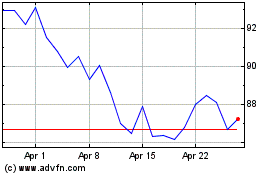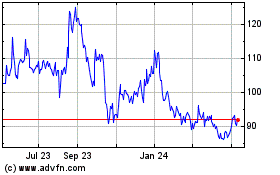By Samantha Pearson and Luciana Magalhaes in São Paulo and Chao Deng in Tapei
China's Sinovac vaccine has shown to be 78% effective against
Covid-19 in Brazilian late-stage trials and offers total protection
against severe cases of the disease, raising hopes it can be used
to immunize much of the developing world.
Brazil's Butantan Institute, the São Paulo-based research center
that tested CoronaVac in Phase 3 trials, said Thursday that none of
the volunteers who took the vaccine developed severe cases of
Covid-19. More than 12,000 health workers took part in Phase 3
trials in Brazil, the first country to complete tests of Sinovac's
vaccine.
"It's a great result," said Luiz Carlos Dias, part of a Covid-19
task force of researchers at the University of Campinas in São
Paulo state. "If it can prevent severe cases, hospitalizations,
deaths, it will help get us out of this pandemic."
CoronaVac's vaccine is less effective then those being developed
by Moderna Inc. and jointly by Pfizer Inc. and BioNTech SE that
have shown to have efficacy rates of 94.5% and 95% in testing,
respectively. But CoronaVac can be kept in a standard refrigerator
between about 36 and 46 degrees Fahrenheit, making it easier and
cheaper to transport and store in less developed countries,
infectious disease specialists said.
Prashant Yadav, a global health specialist at Washington-based
think tank Center for Global Development, said 78% is a high enough
rate for many developing countries to consider using the vaccine
and potentially good enough for the World Health Organization to
consider incorporating CoronaVac into its global distribution
system.
"There are a large number of developing countries that haven't
been able to secure supplies," he said. "This could become a very
viable option for them."
Butantan said it is now requesting authorization for emergency
use of the vaccine in Brazil. It is also in talks to start shipping
CoronaVac to Argentina, Bolivia, Colombia, Honduras, Peru and
Uruguay as of May.
Sinovac's vaccine was approved for emergency use by Beijing in
July, along with two other vaccine candidates by Chinese
state-owned vaccine maker Sinopharm. So far, Beijing has only
approved one of Sinopharm's vaccines for broader use in the
country. The green light came after Sinopharm reported its vaccine
to be 79% effective, based on interim analysis.
Unlike the vaccines developed by Modern and Pfizer that use new
types of genetic-codes, CoronaVac uses weakened forms of the virus
to induce an immune response -- a more traditional method that
tends to produce lower efficacy rates, researchers said.
With Covid-19 largely under control in China, the country's
vaccine developers have had to go abroad to conduct their clinical
trials.
Researchers in Turkey, which is at an earlier stage of testing
CoronaVac, said in late December that initial data from around
1,300 people in late-stage trials showed the vaccine to be just
over 91% effective. Indonesia has also been testing the vaccine but
Phase 3 results aren't yet available.
Butantan's director, Dimas Covas, didn't comment on the possible
reason for Turkey's higher result, saying that he expected Sinovac
to consolidate the results from the three countries into one single
efficacy rate.
In Brazil's trials, half of the volunteers took the vaccine,
while the other half took a placebo, Mr. Covas said. During the
Phase 3 tests, 218 of the volunteers contracted Covid-19, he said,
allowing scientists to calculate CoronaVac's efficacy rate by
seeing how many of those people had taken the vaccine or the
placebo. For definitive results, researchers were waiting for a
minimum of 154 volunteers to contract Covid-19 but that figure was
quickly surpassed as the number of new cases of the diseases has
soared in Brazil.
About 200,000 people have now died from Covid-19 in Brazil,
second only to the U.S.
Augusto Capodicasa, who manages a philanthropic hospital in the
coastal city of Santos near São Paulo, said doctors were bracing
for a postholiday surge in cases after many Brazilians threw
parties and headed to the beach over Christmas. While the hospital
has so far managed to deal with demand, Mr. Capodicasa said he
feared the new wave of cases could overwhelm them. "How would I
deal with the choice of whom to give a bed to?" he said. "It's the
biggest fear of every hospital administrator." For the past month,
Brazil has been reporting an average of more than 30,000 new cases
a day.
São Paulo state Gov. João Doria said he plans to use CoronaVac
to immunize the whole of the state, home to a fifth of Brazil's
population, by the end of July. Brazil's Oswaldo Cruz Foundation, a
medical institute, is also expected to request approval as early as
Thursday from the country's regulator for emergency use of the
vaccine developed by AstraZeneca PLC and Oxford University.
Miguel Cendoroglo Neto, chief medical officer of the Israelita
Albert Einstein health-care group, said Brazil would have to rely
on several vaccines to immunize its vast population as quickly as
possible. "If the efficacy rate is lower, you need to immunize more
people to reach herd immunity," he said. But CoronaVac offered a
good solution for Brazil, he said, adding that its efficacy rate
was still higher than many flu vaccines.
Write to Samantha Pearson at samantha.pearson@wsj.com, Luciana
Magalhaes at Luciana.Magalhaes@wsj.com and Chao Deng at
Chao.Deng@wsj.com
(END) Dow Jones Newswires
January 07, 2021 15:28 ET (20:28 GMT)
Copyright (c) 2021 Dow Jones & Company, Inc.
BioNTech (NASDAQ:BNTX)
Historical Stock Chart
From Mar 2024 to Apr 2024

BioNTech (NASDAQ:BNTX)
Historical Stock Chart
From Apr 2023 to Apr 2024
